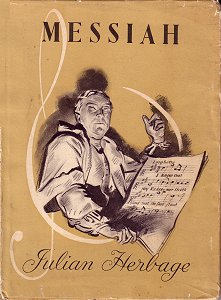| BOOKS |

|
| TITLE: |
MESSIAH |
| AUTHOR: |
JULIAN
HERBAGE |
| PUBLISHER: |
MAX
PARRISH & CO. LIMITED |
| ISBN
(HARDCOVER): |
N/A |
| ISBN (PAPERBACK): |
N/A |
| UPC/EAN: |
N/A |
| LCCN: |
N/A |
| YEAR: |
1948 |
| SERIES: |
THE
WORLD OF MUSIC |
| PAGES: |
72
P. |
| PUB.
LOCATION: |
LONDON |
| DDC: |
N/A |
| EXCERPT: |
CLICK HERE
FOR SAMPLE PAGE (.PDF) |
|
|
|
| DESCRIPTION:
This book traces the fascinating story
of the sublime Oratorio from the frustration
and despair out of which it was born, through
the great Commemoration performances of the
last century, to its present deep hold on the
hearts of the English people and its immortal
place in the world of music. Julian
Herbage was responsible for many years for the
broadcast series "The Foundations of Music".
In 1935 he edited the score of 'Messiah'
for the broadcast marking the
two-hundred-and-fiftieth anniversary of
Handel's birth. This material was lost
by enemy action, and he again edited the score
for the bicentenary of the first performance
of 'Messiah' in 1942. |
SITE RATING: 8/10
SITE
REVIEW: Julian
Herbage's 1948 book Messiah remains a good
beginner's overview of the creation of that
work, a biography of both George Frideric
Handel, and the germination and subsequent
history of the oratorio. Filled with
color and blank-and-white illustrations, this
book is strongly reminiscent of Tim Slover's 2007 book,
which also concerns itself more with the
popular history, rather than the musical
achievements of Messiah. But Herbage's
book goes a bit further than Slover's,
discussing the slight dip in popularity of
Handel's music in the decades following his
death, Mozart's admiration and
reorchestrations; the large spectacular
concerts which began to take hold in England's
Crystal Palace and beyond, and finishes up
with Ebenezer Proust's performing edition of
the score which became standard for
generations. Herbage's prose is clean
and natural - more conversational than
scholarly, befitting its introductory, layman
audience, and the illustrations are useful,
running the gamut from full-color portraits to
photographs of Handel's death mask and epitaph
in Westminster Abbey. Some of the era's
florid language seeps into the author's
writing, but Herbage's book remains, even (as
of this writing) sixty years after its
publication, a fine, fact-filled introduction
to Handel's Messiah.
|
|

